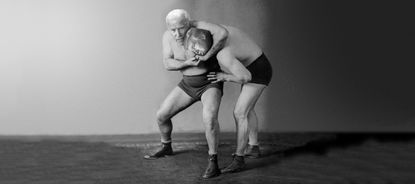The retrograde fantasies of a Trump-Biden rumble
Not exactly Ali-Frazier, is it?


1984: Amid questions about whether his age is catching up with him, 73-year-old Ronald Reagan suggests that he and his opponent Walter Mondale should have an arm wrestling match. "The issue that worries Americans," Mondale replies with his characteristically keen political radar, "is not arms wrestling but the need for arms control."
2018: Former Vice President Joe Biden, age 75, and President Donald Trump, age 71, get into an argument about which one of them could beat up the other.
Yes, that is actually happening. Speaking on Tuesday, Biden noted the Access Hollywood tape in which Trump bragged about his ability to sexually assault women with impunity. "They asked me if I'd like to debate this gentleman, and I said 'no.' I said, 'If we were in high school, I'd take him behind the gym and beat the hell out of him.'" Trump then responded:
Subscribe to The Week
Escape your echo chamber. Get the facts behind the news, plus analysis from multiple perspectives.

Sign up for The Week's Free Newsletters
From our morning news briefing to a weekly Good News Newsletter, get the best of The Week delivered directly to your inbox.
From our morning news briefing to a weekly Good News Newsletter, get the best of The Week delivered directly to your inbox.
Let's just think for a moment what it would look like if these two septuagenarian marauders really went at it behind the gym. Not exactly Ali-Frazier.
Biden may be placing himself as women's protector in this scenario, but he still validates the idea that the way to stop sexual assault is for other men to mete out punitive violence, so the transgressing man can be brought to heel. The women in this case have no agency of their own; they're the victims or the audience for Biden's display of chivalry.
That is certainly a contrast with Trump, whose audience has always been other men. Throughout his life, Trump enacted a very public performance of dominant male sexuality, one built not on handsomeness or physical prowess but on possessing desirable women, even if it took simply buying them — or pretending that he had dated them when he didn't (ask Carla Bruni). Men were the ones he played to, to show them that he was superior. Consider that when he was engaged to Marla Maples, he negotiated with Playboy for her to pose nude, but she refused to do it. What kind of man would pressure his fiancee to take off her clothes for the world to see? A man who wants other men to desire his woman, in order to elevate his own status.
It was perhaps inevitable that Hillary Clinton, a woman who had spent decades being punished for everything men didn't like about women's liberation, would have to go through a troglodyte like Trump in order to achieve the nation's highest office. And perhaps it was inevitable that she would lose, precisely because he enacted such an exaggerated version of macho posturing, saying things like "I'd like to punch him in the face" when confronted with a protester and talking about the size of his penis in a primary debate — always to the thrill of the crowd.
And of course, much of the thirst for violence was aimed at Clinton herself, from the "Lock her up!" chants to the "Trump That Bitch" t-shirts. Adele Stan, one of the few columnists who foresaw how the enduring power of misogyny would help Trump get elected, caught this nugget at a Trump rally: "She's going, 'Did you hear that Donald Trump raised his voice while speaking to a woman?' Oh, I'm sorry!" he said. "I mean, all of the men, we're petrified to speak to women anymore. We may raise our voice." When I'm elected, he seemed to promise, they'll know their place. It all worked because in 21st century America so many Trump voters felt disempowered, beaten down, left behind by a society that no longer put them at the top of the societal hierarchy. They wanted someone who would punch back.
Men have been anxious about their masculinity as long as there have been men, but at certain recent points in history, societal changes have conspired to heighten that anxiety. In the post-World War II period, for instance, with work increasingly moving from the farm and factory into the office, American men were gripped by a need for two-fisted fantasies. As a result, westerns proliferated — at one point in 1959 there were no fewer than 30 westerns on prime time TV, at a time when there were only three networks. You may have to deal with a jerk of a boss who tells you what to do while you sit behind your desk, but at night you could come home and imagine yourself strolling through town with spurs on your feet, tipping your hat to the ladies at the saloon before you gun down some rustler who looked at you funny.
It only got worse from there, as upper-body strength became less and less important to success. Which brings us inevitably to the contemporary gun culture Trump and other Republicans have done so much to promote. In 2012, just before Adam Lanza used a Bushmaster AR-15 to murder 20 elementary students in Newtown, Connecticut, the company ran a social media ad campaign for their products, in which you could "revoke" a friend's "man card" if he was being too girly or was under the thumb of his lady. The centerpiece was an ad with a picture of a semi-automatic rifle and the words, "Consider your man card reissued."
It was a little too on the nose, and they withdrew the ads after Newtown. But today, our president, who got out of Vietnam because of supposed "bone spurs" and never faces a physical test more challenging than finishing a KFC bucket, fantasizes that if he came across a school shooting, "I really believe I'd run in there even if I didn't have a weapon." Right.
There have been many books written about how tolerance and support for the use of violence in everyday life is related to conservative ideology, but as Joe Biden shows, the idea that strength lies in the ability and willingness to use violence against others is hardly restricted to the right. Yet if there's an iron law of actual toughness, it's that tough guys don't go around talking about how tough they are, in the same way that actual smart people don't say things like "I have a very good brain."
We may continue to progress as a society and make daily violence less acceptable, but the forces of backlash will always linger. There will always be men who thrill to a poser like Trump, who says in public what they think in private: that he's a man's man, and you can tell by the fact that if you question it and tickle his insecurity, he'll beat the crap out of you. It's all a show, of course — Trump isn't going to beat up anybody. But that doesn't make it any less powerful.
Sign up for Today's Best Articles in your inbox
A free daily email with the biggest news stories of the day – and the best features from TheWeek.com
Paul Waldman is a senior writer with The American Prospect magazine and a blogger for The Washington Post. His writing has appeared in dozens of newspapers, magazines, and web sites, and he is the author or co-author of four books on media and politics.
-
 Why more and more adults are reaching for soft toys
Why more and more adults are reaching for soft toysUnder The Radar Does the popularity of the Squishmallow show Gen Z are 'scared to grow up'?
By Chas Newkey-Burden, The Week UK Published
-
 Magazine solutions - December 27, 2024 / January 3, 2025
Magazine solutions - December 27, 2024 / January 3, 2025Puzzles and Quizzes Issue - December 27, 2024 / January 3, 2025
By The Week US Published
-
 Magazine printables - December 27, 2024 / January 3, 2025
Magazine printables - December 27, 2024 / January 3, 2025Puzzles and Quizzes Issue - December 27, 2024 / January 3, 2025
By The Week US Published
-
 US election: who the billionaires are backing
US election: who the billionaires are backingThe Explainer More have endorsed Kamala Harris than Donald Trump, but among the 'ultra-rich' the split is more even
By Harriet Marsden, The Week UK Published
-
 US election: where things stand with one week to go
US election: where things stand with one week to goThe Explainer Harris' lead in the polls has been narrowing in Trump's favour, but her campaign remains 'cautiously optimistic'
By Harriet Marsden, The Week UK Published
-
 Is Trump okay?
Is Trump okay?Today's Big Question Former president's mental fitness and alleged cognitive decline firmly back in the spotlight after 'bizarre' town hall event
By Harriet Marsden, The Week UK Published
-
 The life and times of Kamala Harris
The life and times of Kamala HarrisThe Explainer The vice-president is narrowly leading the race to become the next US president. How did she get to where she is now?
By The Week UK Published
-
 Will 'weirdly civil' VP debate move dial in US election?
Will 'weirdly civil' VP debate move dial in US election?Today's Big Question 'Diametrically opposed' candidates showed 'a lot of commonality' on some issues, but offered competing visions for America's future and democracy
By Harriet Marsden, The Week UK Published
-
 1 of 6 'Trump Train' drivers liable in Biden bus blockade
1 of 6 'Trump Train' drivers liable in Biden bus blockadeSpeed Read Only one of the accused was found liable in the case concerning the deliberate slowing of a 2020 Biden campaign bus
By Peter Weber, The Week US Published
-
 How could J.D. Vance impact the special relationship?
How could J.D. Vance impact the special relationship?Today's Big Question Trump's hawkish pick for VP said UK is the first 'truly Islamist country' with a nuclear weapon
By Harriet Marsden, The Week UK Published
-
 Biden, Trump urge calm after assassination attempt
Biden, Trump urge calm after assassination attemptSpeed Reads A 20-year-old gunman grazed Trump's ear and fatally shot a rally attendee on Saturday
By Peter Weber, The Week US Published